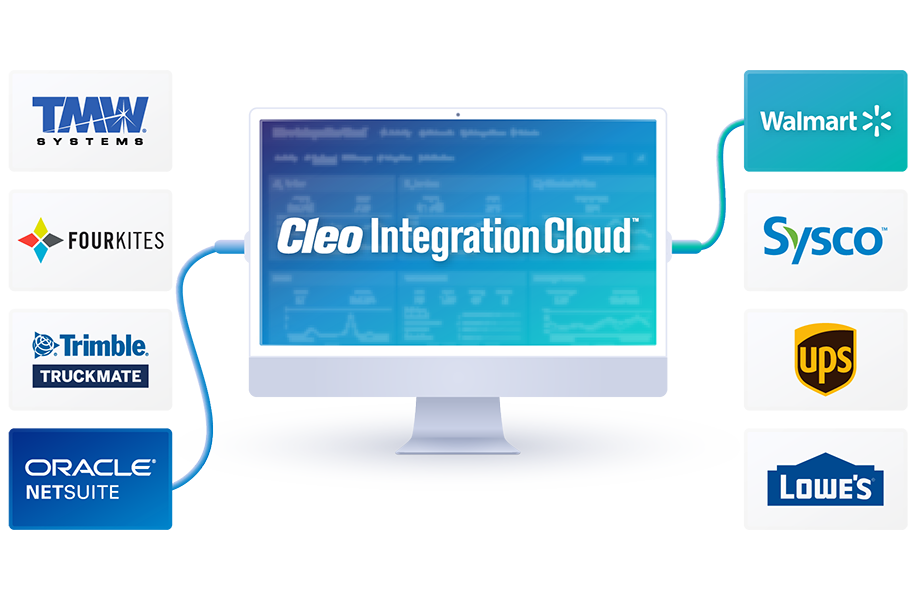Enterprise Integration Solutions

Growing enterprises often encounter a plethora of system complexity issues that result in slow, vulnerable systems and processes. These problems are usually exacerbated when legacy applications are involved. This can make fluid connectivity across an enterprise seem near impossible.
And in today’s digital world, enterprise integration is not just important; it's indispensable.
Enterprise integration unlocks heightened productivity and data-driven decision-making, while performing accurate data transformations and flows as needed. Cleo Integration Cloud (CIC) simplifies these intricate processes, as it is built to effortlessly unite applications, services, systems, and databases across an enterprise’s digital ecosystem, clearing the path to a more streamlined, interconnected, and transparent future.
So, does the enterprise get bombarded with complexities involving:
- Application-to-application
- System-to-application integration with internal resource planning
- ESB
- Legacy EDI
- Cloud solutions
- Web Services
- API
- SaaS
- Supporting connectivity to your external communities
Of course, it does. Enterprise integration is not merely an option; it's a necessity that empowers the enterprise to scale and thrive. That's why you need a solution that makes ecosystem and application integration simple.
Enterprise Integration Challenges
Not all integration solutions are created equally. Subpar integration software often leaves companies scrambling for patchwork “fixes” that are not viable, long-term solutions. These frustrations and routine errors can eventually lead enterprises to migrate to a different integration software that addresses their needs.
Some integration challenges enterprises often run into include:
1. System Interconnectivity:
Businesses require a streamlined method for connecting systems to ensure the timely delivery of information and resources to the right recipients.
2. Data Integration:
To enhance problem-solving capabilities, data from diverse systems (legacy, modern, cloud, etc.) must be seamlessly integrated (EDI integration, API integration, B2B system integration, ERP integration).
3. Integration Complexity:
This challenge lies in orchestrating connections between various systems, primarily due to the differences in data formats and protocols.
4. Custom Integration:
Many organizations opt for custom integration to address their challenges, but this comes with its own set of issues, including:
a. Brittleness: Fragile and prone to breaking.
b. Complexity: Intricate and difficult to manage.
c. Costly: Expensive to develop and maintain.
d. Scalability: Trouble scaling as a business expands.
e. Knowledge: Only the person who wrote the code knows how it functions.
5. Maintenance Dependency:
Frequent upkeep (updates, fixes, etc.) that often require skilled developers can slow down operations.
6. Lack of Business Agility:
Businesses face limitations in their agility and progress with limited access to robust integration features and capabilities.
Essential Advantages of Enterprise Integration Solutions
Despite these challenges, enterprise integration remains essential to businesses for several compelling reasons, such as:
1. Seamless System Interconnectivity: Enterprise integration seamlessly connects people, processes, systems, and technologies within an organizational ecosystem. This interconnectedness promotes a unified and cohesive work environment where data and information flow effortlessly between different parts of the business—whether between internal and external systems, various teams and departments, trading partners, etc.
2. Enhanced Company-Wide Productivity: Through effective integration, businesses enable communication across systems, granting employees access to critical, real-time information when they need it. This improved accessibility not only boosts individual productivity but also breaks down data silos to promote collaboration among teams and departments, thus improving knowledge sharing and strengthening decision-making.
3. Increased Data Accuracy: Enterprise integration ensures users always have access to accurate, real-time data, regardless of the systems they use. This data integrity is crucial for making informed decisions and executing business processes effectively. With integrated systems, there is less risk of incorrect data because of automation which removes the need for manual data entry or pulling. This is vital because making decisions based on incorrect or outdated data can have devastating consequences. With a solid integration solution though, automation provides users with real-time data that can be found in one, easy-to-access and centralized location.
4. Real-Time Data + Data Insight: In today's fast-paced world, timely information is essential for making quick decisions and maintaining nimble business operations. Enterprise integration provides real-time updates by synchronizing data across all systems in a digital ecosystem. Access to this data means users can stay on top of market trends, customer preferences, inventory levels, and other critical factors that affect their businesses. Real-time insights enable users to adapt quickly to changing circumstances which will give companies a competitive edge.
5. Automated Business Processes: Integration enables automation of the enterprise's core revenue-generating business processes. By connecting different systems and applications, routine tasks and workflows can be automated to reduce manual intervention. This streamlines operations, reduces errors, lightens employees' bandwidth so they can focus on more strategic tasks, and decreases labor costs over time. Automated processes are not only more efficient but also less prone to human error that can disrupt or halt supply chains.
6. Strengthen Partner Relationships: From faster partner onboarding to relationship management, enterprise integration solutions facilitate seamless communication and collaboration with trading partners, enhancing business relationships and creating happier customers which promotes long-term success.
Oftentimes, businesses that embrace enterprise integration are better positioned to swiftly adapt to market changes and customer demands. This agility provides a competitive edge, allowing them to seize opportunities as they arise and navigate challenges more effectively than competitors still grappling with disconnected systems.
Cleo Integration Cloud Offers Top-Tier Enterprise Integration Solutions
Welcome to a world where intricate integration is not only unified, but simplified. With Cleo Integration Cloud (CIC), the complexities of enterprise integration fade into the background, while our easy-to-navigate platform gives users the control and visibility they need to effortlessly unify applications, services, systems, and databases across their digital ecosystem. Cleo Integration Cloud is more than a solution; it's a gateway to a more agile, informed, and competitive future.
Let's explore some key features that make Cleo Integration Cloud one of the best options for enterprise integration solutions.
1. Enterprise Integration Capabilities
Cleo Integration Cloud offers a unified self-service platform that empowers organizations to navigate the intricate world of data integration seamlessly. CIC stands out by:
Supporting Any Type or Amount of Enterprise Integrations: End-to-end integration solutions for a wide range of transaction types, including real-time APIs, EDI (Electronic Data Interchange), and non-EDI transactions (e.g., MFT). This robust flexibility ensures that businesses can connect with any partner or system effortlessly, creating more business opportunities so their businesses can grow.
Redefining Self-Service and Managed Services: Our array of service options with varying levels of responsibility allows companies to pick the approach that best fits their needs. Companies can switch between service approaches since Cleo understands a business’s needs evolve over time. At Cleo, we guarantee visibility and transparency into integrations, transactions, and supply chains no matter what service plan a company chooses.
2. Enterprise Ecosystem Network
In the world of enterprise integration, having a vast and dynamic trading partner network is invaluable. Cleo Integration Cloud excels in this area via:
Expansive Partner Networks: A diverse network of partners that continues to grow. This extensive network ensures that our customers can connect with their existing partners and seamlessly onboard new ones, no matter where they are in the world.
Onboarding Partners at Ecosystem Speed: Streamlines onboarding new partners with pre-built partner maps and customizable templates that make the process quick and painless. Our fast onboarding process allows customers to expand their business relationships with ease and expedite time-to-revenue, promoting growth and collaboration.
3. Ecosystem Relationship Management
Cleo Integration Cloud is not just about connecting systems; it's about fostering and maintaining strong business relationships. It helps organizations become top-tier trading partners that other companies want to conduct business with by:
Delivering on All Business Commitments: Meet and exceed business commitments. Confidently exchange data knowing that Cleo provides the tools and visibility to monitor and ensure the timely delivery of information, so SLAs are never missed again. Features like automation, real-time data and updates, and customizable notifications, are essential in delivering on business commitments, maintaining positive vendor scorecards, and keeping customers satisfied.
Providing Agility to Swiftly Adapt: In today's fast-paced business environment, agility is crucial. Cleo Integration Cloud equips customers with the agility to quickly adapt to evolving business conditions. Whether it's accommodating new partners, adjusting processes, or responding to market shifts, Cleo has you covered.
Supplying Business Control and Visibility: Achieve an unparalleled level of control and visibility over integrations and supply chains. Proactively manage integration environments by drilling down into each transaction when necessary, to remain informed on the status of each order. With Cleo, businesses have the insights and tools needed to strengthen their trading partnerships, such as customizable dashboards for each user so they only see the data that’s relevant to them.
Cleo Integration Cloud is more than an integration platform; it is a strategic tool that empowers enterprise organizations to excel in the world of integration and beyond by providing features such as:
- Business Process Automation: The ability to automate integrations, data transformations, and manual tasks to save time and reduce errors.
- Data Transformation: The process of converting data from one format to another, to make it easier to use and analyze.
- Real-time data and updates: The ability to view and access data as soon as it is generated, without having to wait for it to be processed or updated.
- Pre-built maps, customizable templates, and accelerators that minimize onboarding times: Pre-built integrations and templates that can be quickly and easily customized to meet your specific needs, reducing the time it takes to get started.
- Error resolution tools and alerts: Tools and alerts that help you to identify and resolve errors quickly and easily, minimizing disruptions to your business.
- Support for 20+ protocols: The ability to connect to and exchange data with a wide range of systems and applications, using a variety of protocols.
- EDI, API, MFT, and eCommerce capabilities: Support for electronic data interchange (EDI), application programming interfaces (APIs), managed file transfer (MFT), and eCommerce platforms.
- Customizable dashboards: Dashboards that can be customized to display the data and metrics that are most important to you.
- Enterprise Data Security: Notifications that can be sent to you within the platform or via email, so that you are always aware of important events.
- Self-service, managed services, and hybrid options with 24/7 support: The ability to choose the level of support that best meets your needs, from self-service to fully managed services. 24/7 support is available for all options.
- Cloud and on-premise solutions: The ability to deploy your solution in the cloud or on-premise, depending on your specific needs and preferences.
- Drag-and-drop functionality with an easy-to-navigate user interface: A user interface that is easy to use and navigate, with drag-and-drop functionality that makes it easy to create and manage tasks and workflows.
By harnessing the innovative capabilities of Cleo Integration Cloud, your business can modernize its digital ecosystem, optimize processes so they perform more accurately and efficiently, scale your company, and improve customer relationships. Take advantage of Cleo’s unifying self-service platform, expansive trading partner network, and commitment to relationship management, and unlock the full potential of your business integration capabilities today.
If you have integration questions related to your enterprise, speak with experts at Cleo who (collectively) will bring 900+ years of integration experience to the conversation. Contact us at sales@cleo.com or +1.815.282.7695. Lastly, explore more relevant resources through our resource library.

About Cleo

Instantly access demo videos

Comprehensive Guide to Gaining B2B Control

Duraflame Case Study
